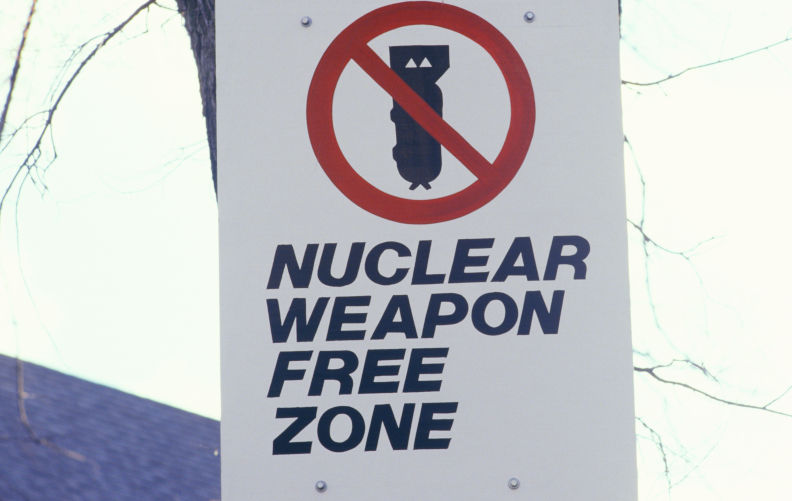No, it is not time for Australia to acquire its own nuclear weapons
May 2, 2025
Clive Hamilton’s proposal that Australia should consider acquiring nuclear weapons relies on several flawed assumptions. The biggest of these is the myth that nuclear weapons make us — or anybody — safer.
Nuclear weapons present the greatest existential threat to humanity. Since the 1962 Cuban missile crisis, there have been at least six occasions when either the USSR/Russia or US commenced launch procedures for nuclear war in the mistaken belief they were under nuclear attack. There have been many more serious accidents and near misses when humanity’s fate has hung in the balance. More wars, potential flashpoints for nuclear escalation, are breaking out in our climate-stressed world. Cyber warfare and artificial intelligence exacerbate the perennial dangers of human and technical errors, misinformation and bad decisions.
If nuclear weapons are used, the evidence from military planning and exercises, and those who’ve commanded nuclear weapons, points to outcomes ranging from rapid escalation to large-scale nuclear war.
Extensive research has shown that use of nuclear weapons would be catastrophic for humanity and the whole biosphere. Even a nuclear war between, for example, India and Pakistan, using less than 3% of the world’s nuclear weapons, would blanket the upper atmosphere over the planet for a decade with enough smoke from burning cities to drop temperatures to ice-age levels, decimating agriculture and causing more than two billion people to die of starvation. Nuclear war between the US and Russia could kill more than five billion people worldwide from starvation alone within two years.
Nuclear weapons are not targetable or containable weapons; they are global suicide bombs that must never be used.
To quote UN Secretary-General Antonio Guterres in 2022: “Today, humanity is just one misunderstanding, one miscalculation away from nuclear annihilation.”
Since then, geopolitical tensions, conflicts and erratic leadership have escalated, increasing nuclear danger. Proliferating nuclear weapons in response to insecurity will just increase the likelihood of their being used, just as increased gun availability in the US has resulted in a massively increased risk of being shot.
As gun control has reduced gun deaths in Australia, the only rational approach to the risks posed by these weapons is disarmament. Verified treaties and leadership have brought nuclear stockpiles down from more than 70,000 to 12,300, but the number is growing again. We must get rid of nuclear weapons before they otherwise, inevitably, kill us all.
Australia, under both Labor and the Coalition, has rejected acquisition of nuclear weapons, joining both the nuclear Non-Proliferation Treaty and the South Pacific Nuclear Free Zone Treaty. The _South Pacific Nuclear Free Zone Treaty Act_ expressly outlaws Australia from obtaining nuclear weapons.
Hamilton acknowledges war between China and the US would be fundamentally unwinnable. The losses on both sides and for the rest of the world are beyond imagining. In the nuclear era, the only options are co-existence or non-existence.
Dismissing diplomacy and other statecraft in favour of Australian nuclear weapons and the global arms race they would aggravate is a recipe for nuclear proliferation. It would increase the risk of nuclear war and poison good relations with our Pacific and Asian neighbours. Even before any detonation, the massive costs would reduce spending on healthcare, housing, education, climate action, disaster response capacity, aged and disability care.
The military bases at Pine Gap, North West Cape, Tindal and HMAS Stirling are all already nuclear targets. Australian nuclear weapons would only increase the number and priority of targets for conventional or nuclear attack.
Another myth is that nuclear deterrence works. These worst of all inhumane and indiscriminate weapons do not prevent wars – Pakistan and India have clashed repeatedly and Hamas has attacked nuclear-armed Israel. Nuclear-armed powers did not prevail in Vietnam or Afghanistan. Nor do nuclear weapons prevent terror attacks. Assuming that the US would defend Australia with nuclear weapons and risk nuclear attack on the US in return is wishful thinking – as President Donald Trump has made very clear.
Nuclear-armed states use their weapons for more than deterrence. As US Navy Admiral Charles Richard, then chief of the US Strategic Command, wrote in 2021:
“We must acknowledge the foundational nature of our nation’s strategic nuclear forces, as they create the ‘manoeuvre space’ for us to project conventional military power strategically." Russia’s invasion of Ukraine and Israel’s genocidal war on Gaza are but the latest illegal aggressions enabled “under cover” of nuclear weapons.
The elimination of nuclear weapons is the only sure way to eliminate the danger of their use. The Treaty on the Prohibition of Nuclear Weapons adopted by 122 countries at the UN in 2017 took effect in 2021. Half the world’s nations have joined. Three-quarters of Australians want us to end any support for nuclear weapons and join the TPNW, just as we have joined and thereby strengthened the bans on biological and chemical weapons, landmines and cluster munitions. We are out of step with our neighbours, who have almost unanimously joined the TPNW; Indonesia is one of the latest to sign up.
We are at a turning point.
Instead of a fear-based reaction proposing nuclear proliferation, we need to plan for what will work to make the world a safer place for Australians. As the late Pope Francis made clear: “The use of atomic energy for purposes of war is immoral, just as the possessing of nuclear weapons is immoral.” We need good relations with our neighbours and all nations, co-operation on shared global challenges and defence policies focused on the defence of our land and people.
While nuclear weapons exist, every day without a nuclear war is a lucky day.



